The Nominating Committee selected the candidates for the 2010 election (Psychiatric News, October 2), marking the start of the campaign season, and members may want to familiarize themselves with the campaign guidelines.
Guidelines prescribing members' election-related activities were established by the Board of Trustees in the early 1970s, when APA began having contested elections, and have been updated to address major concerns. These concerns are: (1) to guard against massive campaign efforts “buying” an election win, particularly if those efforts are financed by resources from outside the membership, (2) the revulsion against campaign committees and unwelcome bids for public support, (3) the growing distress of the membership at being deluged with campaign materials, and (4) a belief among some members that large-scale campaigning is inconsistent with their conception of APA's professional image.
Thus the guidelines aim “to encourage fair and open campaigning by APA members on a level playing field by (1) specifying permitted and prohibited election-related activities, (2) fostering opportunities for candidates to educate their colleagues about the issues, (3) informing voters about candidate experiences and views, (4) keeping costs down, and (5) maintaining dignified and courteous conduct appropriate to the image of a profession.” Personal attacks against opponents are not permitted.
Candidates and their supporters must use their own resources for election activities (Section A.3). Use of APA, Area Council, and state association/district branch resources or personnel is prohibited. There are limits on the number of letters that each person may write (400 letters for national candidates or 100 for Area or member-in-training trustee-elect office; Section C.1).
The guidelines for use of electronic media should be noted carefully. While there is no limit on the number of campaign messages that may be sent by e-mail (Section B.1, first paragraph), the most common infraction of the guidelines is campaign messages sent without the required “APA Campaigning” at the start of the subject line. The only APA-supported list serve that may be used for campaigning is Member-to-Member (Section B.1, last paragraph).
APA's Web site will once again contain information about candidates, with links to the homepages of candidates who have Web sites.
The Elections Committee recognizes that there always will be problems in implementing the guidelines and in creating guidelines that are entirely equitable, but members have indicated their general satisfaction with the current guidelines. The committee investigates any possible violation of which it becomes aware and reports violations to the Board (Section D.3). The committee is open to suggestions from members on how to improve or change the guidelines.
The Elections Committee encourages members to get involved in the election process, to become informed about the candidates, and to support the candidates of their choice through personal letters, e-mails, or personal contact, and, mainly, to vote in the election. Further, members are urged to vote electronically and to make electronic voting (without receiving a paper ballot) their choice by visiting the following Web page on the APA Web site at <
www.psych.org/optinoptout/>.
On December 22 voting members with e-mail addresses on file with APA will receive an e-mail with instructions for voting online, and paper ballots will be mailed on the same date to those not voting electronically. Further election information and information about the candidates will be included in the December 4 issue of
Psychiatric News. 
